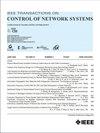Dynamics and Optimization in Spatially Distributed Electrical Vehicle Charging
IF 5
3区 计算机科学
Q2 AUTOMATION & CONTROL SYSTEMS
引用次数: 0
Abstract
We consider a spatially distributed demand for electrical vehicle recharging, which must be covered by a fixed set of charging stations. Arriving electrical vehicles receive feedback on transport times to each station, and waiting times at congested ones, based on which they make a selfish selection. This selection determines total arrival rates in station queues, which are represented by a fluid state; departure rates are modeled under the assumption that clients have a given sojourn time in the system. The resulting differential equation system is analyzed with tools of optimization. We characterize the equilibrium as the solution to a specific convex program, which has connections to optimal transport problems, and also with road traffic theory. In particular, a price of anarchy appears with respect to a social planner's allocation. From a dynamical perspective, global convergence to equilibrium is established, with tools of Lagrange duality and Lyapunov theory. An extension of the model that makes customer demand elastic to observed delays is also presented, and analyzed with extensions of the optimization machinery. Simulations to illustrate the global behavior are presented, which also help validate the model beyond the fluid approximation.空间分布式电动汽车充电动力学与优化
我们考虑一个空间分布的电动汽车充电需求,它必须由一组固定的充电站覆盖。到达的电动汽车会收到到每个站点的运输时间和拥堵站点的等待时间的反馈,并根据这些反馈做出自私的选择。此选择确定车站队列中的总到达率,该队列由流体状态表示;离职率是在假定客户在系统中有给定逗留时间的情况下建模的。用优化工具对得到的微分方程组进行了分析。我们将均衡描述为一个特定凸规划的解,它与最优运输问题有关,也与道路交通理论有关。特别是,无政府状态的代价与社会计划者的分配有关。从动力学的角度出发,利用拉格朗日对偶和李亚普诺夫理论,建立了全局收敛到平衡状态。对模型进行了扩展,使客户需求对观察到的延迟具有弹性,并对优化机制进行了扩展分析。给出了模拟来说明全局行为,这也有助于验证模型超越流体近似。
本文章由计算机程序翻译,如有差异,请以英文原文为准。
求助全文
约1分钟内获得全文
求助全文
来源期刊

IEEE Transactions on Control of Network Systems
Mathematics-Control and Optimization
CiteScore
7.80
自引率
7.10%
发文量
169
期刊介绍:
The IEEE Transactions on Control of Network Systems is committed to the timely publication of high-impact papers at the intersection of control systems and network science. In particular, the journal addresses research on the analysis, design and implementation of networked control systems, as well as control over networks. Relevant work includes the full spectrum from basic research on control systems to the design of engineering solutions for automatic control of, and over, networks. The topics covered by this journal include: Coordinated control and estimation over networks, Control and computation over sensor networks, Control under communication constraints, Control and performance analysis issues that arise in the dynamics of networks used in application areas such as communications, computers, transportation, manufacturing, Web ranking and aggregation, social networks, biology, power systems, economics, Synchronization of activities across a controlled network, Stability analysis of controlled networks, Analysis of networks as hybrid dynamical systems.
 求助内容:
求助内容: 应助结果提醒方式:
应助结果提醒方式:


